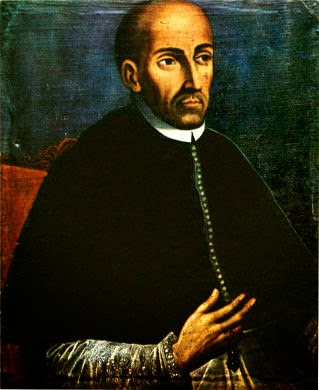Saint Turibius of Mongrovejo
Over the past several days I've been preparing for a webinar that I'll be giving for Paulist Evangelization Ministries on March 25 on the theme of discipleship. (As a side note, it's a free event and all are welcome to take part, so please consider "attending.") As part of my preparation, I've been re-reading sections of The Joy of the Gospel and some of Pope Francis' other writings and speeches. But, I've also been thinking about holy women and men whom I can use as examples of committed discipleship within the presentation. Although he didn't "make the cut," I couldn't help but give some thought to the saint the Church honors on March 23: Turibius of Mongrovejo.
The commitment to follow and imitate Christ took Saint Turibius from his native Spain to the poorest areas of the Andes. For no other purpose than the spread of the Gospel, he dedicated his life to serving and protecting the millions who had been entrusted to his care.
In a sense, the greatest tribute we can give to Saint Turibius is to say that he was a good and holy bishop who did the most he could within the limits and conditions of his time and place. However we might look back on the colonial period in the history of the Americas or on the experiences of the indigenous peoples, we can take some comfort in knowing that there were those who were committed to protecting these peoples, their languages, and even their customs from civil authorities who were bent on increasing their own wealth and power. As a faithful pastor, Saint Turibius recognized these abuses for what they were and, when he was criticized for attempting to change a broken system in which established abusive customs (of both religious and secular authorities) had taken on the weight of law, he strongly replied, "Christ called himself the Truth, not the custom."
As we continue our Lenten good works, take some time to pray for the Church's pastors, asking that God will inspire all of them and each of us with the same commitment to the truth, justice, and the dignity of all people that inspired Saint Turibius.
A prayer in honor of Saint Turibius of Mongrovejo +
Lord, through the apostolic work of Saint Turibius and his unwavering love of truth, you helped your Church to grow. May your chosen people continue to grow in faith and holiness. Grant this through our Lord Jesus Christ, Your Son, who lives and reigns with you and the Holy Spirit, one God, for ever and ever. Amen.
(from The Roman Missal)
Saint Turibius was born in Spain in 1538.
After teaching law at the University of Salamanca, he was appointed bishop of
Lima, Peru, in 1580. A zealous pastor, he ministered to the people of
Peru for the next twenty-five years. He traveled through the 18,000 square miles of his diocese at least three times and he worked for reform within the local church, often at odds with the political representatives who claimed a great deal of authority in church matters. He
established the first seminary in the Americas and baptized and confirmed
nearly a million people, including Saint Martin de Porres and Saint Rose of Lima.
Devoting special time and energy to the
needs of the indigenous peoples of Peru, he learned the local languages and
opposed all attempts to justify their mistreatment by Spanish colonials. In 1598, after his third pastoral trip, he wrote to Pope Clement VIII that he had personally visited the country,
getting to know and minister to my flock, correcting and remedying abuses where necessary, preaching on Sundays and feast-days to both natives and Spaniards in their own tongues and confirming a vast number of people, travelling more than five thousand two hundred leagues, often on foot, on unsafe roads and over rivers, overcoming every difficulty, sometimes going without food or sleep; going to the remote parts where there are Christian Indians (often at war with other Indians) to whom no prelate or Visitor had ever come.Saint Turibius died on March 23, 1606, and was proclaimed a saint in 1726. Today he is honored as the patron of Peru and as a special patron of those who work for the rights of immigrants and native peoples.
In a sense, the greatest tribute we can give to Saint Turibius is to say that he was a good and holy bishop who did the most he could within the limits and conditions of his time and place. However we might look back on the colonial period in the history of the Americas or on the experiences of the indigenous peoples, we can take some comfort in knowing that there were those who were committed to protecting these peoples, their languages, and even their customs from civil authorities who were bent on increasing their own wealth and power. As a faithful pastor, Saint Turibius recognized these abuses for what they were and, when he was criticized for attempting to change a broken system in which established abusive customs (of both religious and secular authorities) had taken on the weight of law, he strongly replied, "Christ called himself the Truth, not the custom."
As we continue our Lenten good works, take some time to pray for the Church's pastors, asking that God will inspire all of them and each of us with the same commitment to the truth, justice, and the dignity of all people that inspired Saint Turibius.
A prayer in honor of Saint Turibius of Mongrovejo +
Lord, through the apostolic work of Saint Turibius and his unwavering love of truth, you helped your Church to grow. May your chosen people continue to grow in faith and holiness. Grant this through our Lord Jesus Christ, Your Son, who lives and reigns with you and the Holy Spirit, one God, for ever and ever. Amen.
(from The Roman Missal)




Comments
Post a Comment